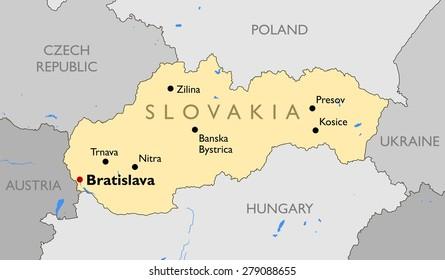Slovakia has expressed reservations regarding the European Union’s recently proposed 19th sanctions package targeting Russia, signaling growing unease within the bloc about the escalating measures. As the EU seeks to tighten economic pressure on Moscow amid the ongoing conflict, Bratislava’s cautious stance highlights the complex balance between solidarity and national interests among member states. This development adds a new dimension to the often contentious discussions surrounding the bloc’s response to Russia’s actions, underscoring differing perspectives within the Union.
Slovakia Questions Effectiveness of EU’s Latest Sanctions Against Russia
Slovak officials have raised doubts about the tangible impact of the European Union’s latest round of sanctions targeting Russia, marking the 19th package since the conflict began. Government representatives argue that while the sanctions aim to intensify pressure on Moscow, the measures risk unintended economic consequences for EU member states, especially those heavily reliant on Russian energy imports. The Slovak Ministry of Foreign Affairs emphasized the need for a more strategic approach that balances political objectives with economic sustainability.
Key points highlighted by Slovakia include:
- Potential disruptions to energy supplies affecting industrial sectors and consumers.
- Limited effectiveness in altering Russia’s geopolitical calculations.
- Calls for enhanced coordination among EU members to avoid fragmented policies.
- Support for alternative diplomatic channels alongside sanctions.
| Aspect | Slovakia’s Position | EU Sanctions Objective |
|---|---|---|
| Economic Impact | Risk to energy-intensive industries | Weaken Russian economy |
| Political Effectiveness | Questioned strategic value | Pressure Kremlin to cease hostilities |
| Regional Stability | Concerns over energy security | Maintain EU unity and security |
Experts Warn of Economic Fallout and Regional Stability Risks
Leading economists and political analysts have raised significant alarms about the potential repercussions of the EU’s latest sanctions package on Russia. They warn that while the intent is to apply pressure on Moscow, the economic fallout could extend far beyond the intended target. Countries within the EU, particularly those in Central and Eastern Europe, may face unintended consequences such as supply chain disruptions, increased energy prices, and inflationary pressures. These factors threaten to destabilize domestic markets, hinder recovery efforts post-pandemic, and strain public support for ongoing foreign policy measures.
Regional stability is also a growing concern. Experts emphasize that increased economic strain might exacerbate geopolitical tensions, not only between Russia and the EU but also within the surrounding neighborhood. In particular, smaller states bordering Russia could become more vulnerable economically and politically, making them susceptible to external influence or unrest. Below is a summary of key risk factors associated with the sanctions package:
- Energy dependency: Potential shortages and price surges in gas and oil supplies.
- Trade disruption: Interruptions in supply chains affecting manufacturing sectors.
- Inflation spike: Rising costs putting pressure on household incomes.
- Political instability: Increased risk of social unrest amid economic hardship.
| Impact Area | Potential Consequence | Timeframe |
|---|---|---|
| Energy Prices | Up to 30% increase in natural gas costs | Next 6-12 months |
| Manufacturing Output | Delayed deliveries and production cuts | Immediate to short term |
| Inflation Rate | Projected rise by 4-5% | 6 months |
| Social Unrest | Heightened protests and strikes | Short to medium term |
Calls for Targeted Measures and Enhanced Diplomatic Engagement to Mitigate Impact
Slovak officials have emphasized the urgent need for targeted sanctions that minimize collateral damage to European economies while maintaining pressure on Russia. Concerns arise over the broad scope of the 19th sanctions package, which some argue could disproportionately affect Slovakia’s energy security and trade relations. Policymakers advocate for a more strategic approach, urging EU members to focus on specific sectors linked directly to the conflict, thereby avoiding unintended consequences on civilian populations and allied economies.
In parallel, calls for a revitalized diplomatic dialogue have gained momentum. Experts warn that sanctions alone may not suffice without parallel efforts to foster negotiations between conflicting parties. The Slovak government proposes enhanced multilateral engagement, aiming to reopen communication channels and explore pathways toward de-escalation. This dual strategy, combining calibrated economic measures with proactive diplomacy, is viewed as essential to mitigating long-term impacts and achieving sustainable resolution.
- Focus on energy sector exemptions to protect EU member states reliant on Russian supplies.
- Increased support for diplomatic mediation initiatives involving Eastern European stakeholders.
- Monitoring mechanisms to assess the socioeconomic effects of sanctions in real time.
| Measure | Purpose | Expected Outcome |
|---|---|---|
| Sector-Specific Sanctions | Reduce collateral damage | Targeted economic pressure |
| Diplomatic Talks | Reopen engagement | De-escalation of tensions |
| Real-Time Monitoring | Track impact | Adaptive policy responses |
In Conclusion
As the European Union moves forward with its 19th sanctions package targeting Russia, Slovakia’s hesitation highlights the ongoing complexities within the bloc regarding the best approach to the conflict. While Brussels seeks a unified stance, member states like Slovakia underscore the need to balance punitive measures with broader regional security and economic considerations. How the EU navigates these internal differences will be critical in shaping the effectiveness and unity of its response moving ahead.
















